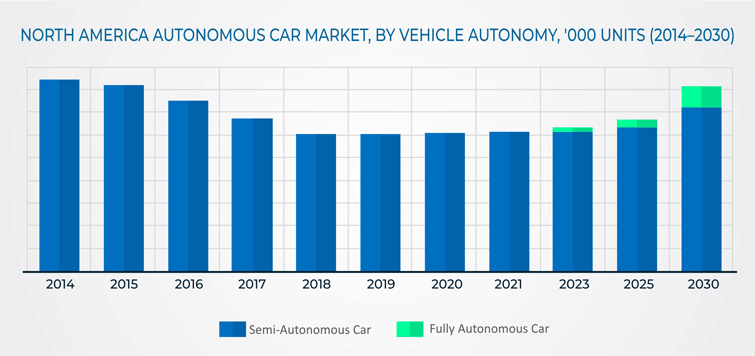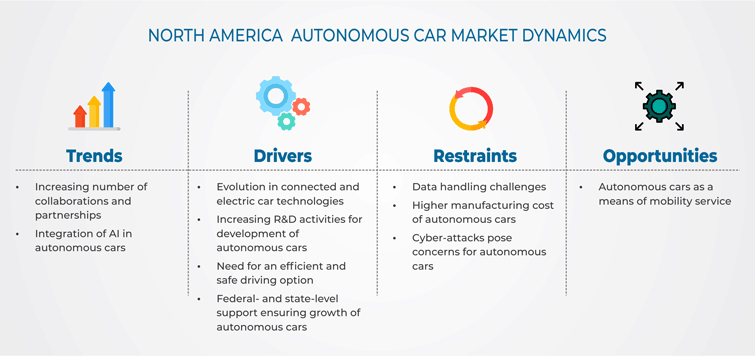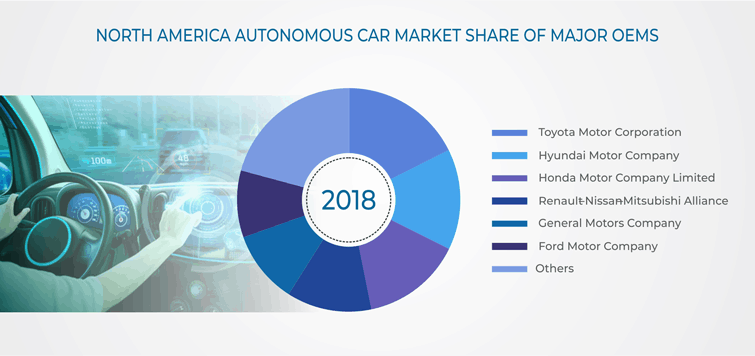Report Code: 11671 | Available Format: PDF | Pages: 166
North American Autonomous Car Market Research Report: By Vehicle Autonomy (Semi-Autonomous Car, Fully Autonomous Car), Vehicle Type (Internal Combustion Engine, Hybrid Electric Vehicle, Battery Electric Vehicle), Application (Personal, Commercial), Regional Insight (U.S., Canada) - Industry Trend, Competition Analysis and Forecast to 2030
- Report Code: 11671
- Available Format: PDF
- Pages: 166
- Report Description
- Table of Contents
- Market Segmentation
- Request Free Sample
North America Autonomous Car Market Overview
The market for fully autonomous cars in North America is expected to reach $52.3 billion by 2030, growing at a CAGR of 17.1% during 2023–2030 period. The growing demand for efficient and safe driving option, increasing research and development (R&D) activities for the development of autonomous cars, and support from federal and state governments for the evolution of autonomous cars are the major factors fuelling the growth of the North American autonomous car market. Autonomous technologies offer safer performance and smoother road traffic, which are the major reasons for attraction of consumers toward these cars.

On the basis of vehicle autonomy, the North American autonomous car market has been categorized into semi-autonomous car and fully autonomous car. Of these, semi-autonomous cars dominated the market, with level 1 semi-autonomous cars holding the largest share, in 2018. However, fully autonomous cars are expected to witness the fastest growth in the coming years. The adoption of level 4 and level 5 autonomous cars for sharing services will lead to the growth of the market for these cars.
Based on vehicle type, the North American autonomous car market has been categorized into internal combustion engine (ICE), hybrid electric vehicle (HEV), and battery electric vehicle (BEV). Among these, ICE-based autonomous cars held the largest market share, of above 85%, in 2018, in terms of volume. However, during the forecast period, BEVs are expected to witness the fastest growth, owing to the increasing support from governments in the form of incentives and grants for the adoption of battery electric cars, and stringent emission regulations.
On the basis of application, the North American autonomous car market has been categorized into personal and commercial. The autonomous cars used for commercial applications are expected to obtain faster growth during the forecast period. Sharing services have grown significantly in the region in recent years. The growing availability of shared autonomous cars in the region is changing the car ownership scenario. Many people during the forecast period are predicted to use sharing services frequently, thus boosting the adoption of autonomous cars for commercial applications.
Geographically, the North American autonomous car market has been categorized into the U.S. and Canada. Between the two, the U.S. dominated the regional market in 2018, owing to the customers’ inclination toward more-advanced cars (level 2 autonomy). Also, the presence of a large number of OEMs, which are launching new models with advanced levels of automation is boosting the market for autonomous cars in the country.

North America Autonomous Car Market Dynamics
Drivers
The major factors that are boosting the North American autonomous car market are federal and state governments’ supports for the development of autonomous cars, need for an efficient and safe driving options, evolution in connected and electric car technologies, and increasing R&D activities in the market. As the autonomous vehicle technologies continue to develop, the federal and state governments are also supporting these cars and addressing their potential impact. Every year, the number of legislations being passed with regard to autonomous vehicles (including cars) is gradually increasing. In 2018, 15 states in the U.S. enacted 18 autonomous vehicle related bills, and a total of 29 states have laid down autonomous vehicle-related legislations. Such initiatives taken by the governments are fuelling the market for autonomous cars in the region.
Restraints
Data handling challenges, high manufacturing cost of autonomous cars, and cyber-attacks are some of the major factors restraining the autonomous car market growth in the region. Equipped with hundreds of sensors on board, an autonomous car is capable of producing terabytes of data each day, and the increasing number of autonomous cars will contribute to the generation of data in bulk every day. Today, even at lower level of autonomy, connected cars can upload around 25 gigabytes of data to the cloud on a per-hour basis, and with the growing number of autonomous car facilities, the data being uploaded will also increase. This, in turn, rises the data management issues. Such factors would hinder the growth of the North American autonomous car market.
North America Autonomous Car Market Competitive Landscape
The North American autonomous car market is highly competitive in nature, with many companies involved in collaborations and partnerships activities. For instance, in 2018, Ford Motor Company entered into a partnership with Walmart Inc. to explore the possibility of using self-driving cars for delivering groceries and other consumer goods.

Some of the major manufacturers operating in the North American autonomous car market are Toyota Motor Corporation, Ford Motor Company, General Motors Company, Hyundai Motor Company, Honda Motor Company Limited, Fiat Chrysler Automobiles N.V., Volkswagen Group, BMW Group, Tesla Inc., and Daimler AG. Major technology, software, and component suppliers include Robert Bosch GmbH, Continental AG, DENSO Corporation, Aptiv PLC, and Infineon Technologies AG.
Want a report tailored exactly to your business strategy?
Request CustomizationWant an insight-rich discussion with the report author?
Speak to AnalystOur dedication to providing the most-accurate market information has earned us verification by Dun & Bradstreet (D&B). We strive for quality checking of the highest level to enable data-driven decision making for you
Our insights into the minutest levels of the markets, including the latest trends and competitive landscape, give you all the answers you need to take your business to new heights
With 24/7 research support, we ensure that the wheels of your business never stop turning. Don’t let time stand in your way. Get all your queries answered with a simple phone call or email, as and when required
We take a cautious approach to protecting your personal and confidential information. Trust is the strongest bond that connects us and our clients, and trust we build by complying with all international and domestic data protection and privacy laws